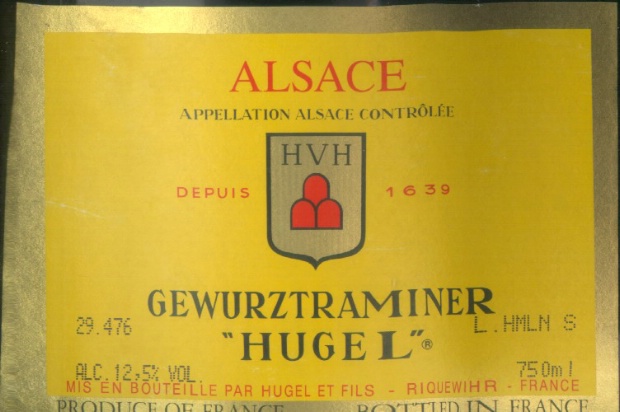Advertisement
Community Tasting Notes (8) Avg Score: points
View all 8 Community Tasting Notes
What Do You Think? Add a Tasting Note
Pro Reviews
Professional reviews have copyrights and you can view them here for your personal use only as private content. To view pro reviews you must either subscribe to a pre-integrated publication or manually enter reviews below. Learn more.
Winedoctor
-
By Chris Kissack
(Hugel Gewurztraminer 'Hugel') Login and sign up and see review text.
September 2004, (See more on Winedoctor...)


6/6/2011 - BlancdeBlanc Does not like this wine: 84 Points
Aroma: honeysuckle, gasoline, oily Palate: Starts dry, ends sweet. Resinous - sappy sweet. Herbal-floral. I tried it with a green chile dish - there was no change in the taste of the wine. Not really bad, but off-putting.
Do you find this review helpful? Yes - No / Comment
4/15/2008 - LPskeleton wrote: 87 Points
Aromatics of Petrol, nuts, smoke, bark, pear and some skunkiness. On the palate oily weight initiates the attack (walnut rind ,lychee, and pear) that transitions to woody spice obvious pear and good length. My favorite gewurtz to date but for some reason I dont like this varietal much due to the flavor profile. I can see how this works with spicy food.
Do you find this review helpful? Yes - No / Comment
11/26/2007 - brutusbuckeye wrote: 86 Points
Lovely pale, steely golden hue with aromas of pineapple, mango, delicious spice on the nose. Wonderfully balanced palate of flavours consistent with the nose with a perfect dry finish that warms the sides of your throat ever so slightly; very nice spicy gewurtz!
Do you find this review helpful? Yes - No / Comment
11/17/2006 - Ombibulous wrote: 86 Points
We drank this with Basmati rice and stewed chicken and pork. Light straw color. Strong flavor that hits you quickly. I would buy this again for $11 a half bottle.
Per www.hugel.com:
2003 was the earliest vintage (harvest) in Alsace since 1893! It was a very unusual year that will long remain in our memory. Budburst was early, flowering begain at the end of May, summer was scorchingly hot and dry, and picking for the still wines began on 8 September. For young vines and for vines planted on lighter soils the crop was particularly small. Results vary widely from vineyard to vineyard, but in general it was a better year for clay-limestone soils. Overall volume was 25% below average. The wines are rich and full, with low acidity levels, much like in 1947. A small quantity of late-harvest Vendange Tardive wines was produced, but no Sélection de Grains Nobles due to the absence of botrytis (noble rot). The wines should be quick to develop and ready to drink quite soon.
VINIFICATION: Generic Hugel wines are made exclusively from grapes purchased from winegrowers under long-term contract, in a dozen of the most favoured localities in and around Riquewihr. The grapes are taken in small tubs to the presses, which are filled by gravity, without any pumping or other mechanical intervention. After pressing, the must is decanted for a few hours, then fermented in temperature-controlled barrels or vats (at 18 to 24°C). The wine is racked just once, before natural clarification during the course of the winter. The following spring, the wine is lightly filtered just before bottling, and the bottles are then aged in our cellars until released for sale.
TASTING NOTES (by Serge Dubs, World's Best Sommelier 1989): Beautiful appearance combines a velvety opulence with the brightness of youth. Its bouquet is captivating, frank and sincere, an aromatic concentration of fruit (mango, passion fruit, pear, pineapple), flowers (roses, freesia) and a multitude of spices, all in perfect harmony. On the palate it is flatteringly soft and tender, yet despite its richness it finishes dry. This is a fine, dry wine whose fruit and aromas are perfectly balanced. Enjoy it for its perfume and while it is still young. Serve well chilled at 8°C with foods where spices are welcome but not compulsory.
Do you find this review helpful? Yes - No / Comment
10/18/2006 - Stephan O wrote: flawed
Oxidized.
Do you find this review helpful? Yes - No / Comment